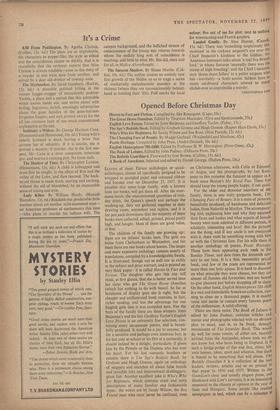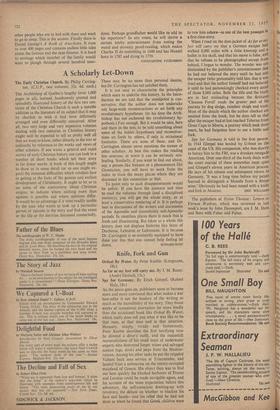Opened Before Christmas Day
Horses in Fact and Fiction. Compiled by Ake Runnquist. (Cape, 35s.) The Great Horse Omnibus. Edited by Thurston Macauley. (Eyre and Spottiswoode, 25s.) English Love Poems. Edited by John Betjeman and Geoffrey Taylor. (Faber, 15s.) The Spy's Bedside Book. Edited by Graham Greene and Hugh Greene. (Rupert Hart-Davis, 15s.) Who's Who for Beginners. By Sandy Wilson and Jon Rose. (Max Parrish, 12s. 6d.) The Changing Face of Beauty. By Madge Garland. (Weidenfeld and Nicolson, 42s.) Poetic Heritage. Compiled by John Press. (Andrd Deutsch, 10s. 6d.) English Masterpieces 709-1800. Edited by Professor H. W. Herrington. (Peter Owen, 42s.) The Book of Leisure. Edited by John Pudney. (Odhams Press, 20s.) The Bedside Guardian 6. Foreword by Ivor Brown. (Collins, 13s. 6d.) A Book of Anecdotes. Selected and edited by Daniel George. (Hutton Press, 18s.)
ELEVEN of them. Eleven anthologies or quasi- anthologies, almost all specifically designed to be wrapped in spangled paper and coloured ribbon and handed over on December 25, 1957. It is possible that some large family, with a known taste for books, will get them all. After the enor- mous lunch, the unaccustomed quantities of mid day drink, the Queen's speech and perhaps the washing-up, they are gathered together in their drawing room, somnolent and replete, and it is for just such drowsiness that the majority of these books were collected, edited, printed, priced pretty high, and bought. Most of them are good value, at that.
The children of the family are growing up : there are no infants' books here. The girls are home from Cheltenham or Westonbirt, and for them there are two books about horses. The larger and more expensive anthology consists mostly of translations, compiled by a knowledgeable Swede. It is illustrated, though not as well nor as richly as the subject and price warrant, and is printed on very thick paper : it is called Horses in Fact and Fiction. The daughter who gets this one will think, at first glance, that she is better served than her sister who got The Great Horse Omnibus (which has nothing to do with buses). So far as lavishness of display goes she is right, but the cheaper and unillustrated book contains, in fact, richer reading, and has the advantage for our English girls that it was compiled here. For the boys of the family there are three winners. John Betjeman's and the late Geoffrey Taylor's English Love Poems is an extremely fine selection, con- taining many uncommon poems, and is beauti- fully produced. It would be a joy to anyone, but for a sensitive and perhaps even amorous boy, in his last year at school or his first at a university, it should indeed be a delight, particularly if given him by the Pamela or the Daphne who has won his heart. For his less romantic brothers or cousins there is The Spy's Bedside Book, by Graham and Hugh Greene, again an anthology of snippets and snatches all about false beards and invisible inks and international skulduggery, great fun. Another excellent joke is Who's Who for Beginners, which contains cruel and witty descriptions of many familiar and fashionable types : the words are by Sandy Wilson, the Boy Friend man who must never be confused, even
on Christmas afternoon, with Colin or Edmund or Angus, and the photographs, by Jon Rose, seem to this reviewer the funniest to appear in a book since Beaton's My Royal Past. These five should keep the young people happy, if not quiet.
For the older and drowsier members of the family, there is one truly gorgeous book, The Changing Face of Beauty. It is a mass of pictures, beautifully produced, of handsome and delicious ladies, from Nefertiti to Marilyn. The accompany- ing text, explaining how and why they adorned their faces and bodies and what aspects of female beauty were most admired in different periods, is scholarly, interesting and brief. But the pictures are the thing, and if any uncle is not overjoyed with it, there must be something wrong with him or with the Christmas fare. For his wife there IS another anthology of poems, Poetic Heritage. These have been appearing each week in the Sunday Times, and date from the sixteenth cen- tury to our time. It is a thin, reasonably priced book, and few of the poets are represented by more than one lyric apiece. It is hard to discover on what principle they were chosen, but they are almost all famous old favourites, and are bound to give pleasure just before dropping off to sleep. On the other hand, English Masterpieces 700-1800 is a vast and formidable American collection, run- ning to close on a thousand pages. It is mostly verse and seems to contain every famous poen', of the millennium. A solid offering.
There are three more. The Book of Leisure is edited by John Pudney, contains articles and stories and photographs selected with no obvious plan in mind, and is, to be frank, strongly reminiscent of The Saturday Book. This would do well for some cousin, of either sex, recently arrived from the Antipodes, whose taste we do not know but who loves being in England. It IS such a hodge-podge of this and that, china, his- toric houses, jokes, sport and whatnot, that there is bound to be something that will please. The Bedside Guardian 6 is. a collection of the best leaders, reviews, articles and so on printed in that paper in 1956 and 1957. Written in the Guardian's clear and usually elegant prose, and illustrated with Low's cartoons, it is an interesting memorial to the climate of opinion in the year of Suez and Hungary. Some people like reading newspapers in bed, which can be a nuisance to other people who are in bed with them and want to go to sleep. This is the answer. Finally there is Daniel George's A Book of Anecdotes. It runs to over 400 pages and contains endless little tales about the famous and the near-famous. It is hard to envisage which member of the family would want to plough through several hundred anec- dotes. Perhaps grandfather would like to add to his repertoire? In any event, he will derive a certain tetchy entertainment from noting the weird and slovenly proof-reading, which makes Charles IL.do something in 1600 and has Handel born in 1785 and dying in 1759.
CONSTANTINE FITZGIBBON











































































 Previous page
Previous page